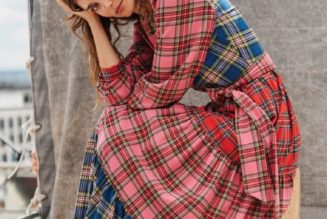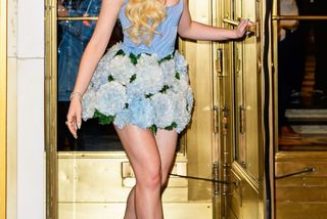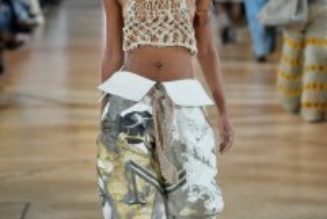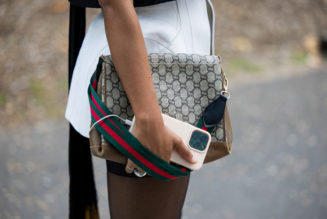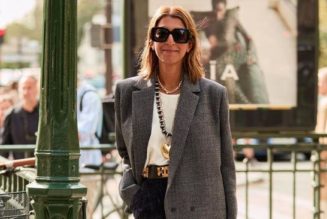
As this year’s Digital Fashion Week gets underway, Ward de Kruiff of EPAM Continuum looks at how emerging tech is reshaping the fashion industry and the luxury brands that make it.
Digital fashion is an experience, and how fashion brands communicate their values digitally is as essential as the designs they create.
A new future for fashion is being shaped by intertwining the values digital consumers insist upon (inclusivity, diversity, and integrity) with cutting-edge technology. In the next few years, this tech will enable fashion brands to create, on a global scale, all kinds of new luxury digital experiences, and marketing opportunities for companies. Increasingly, we can go beyond targeting audiences on centralized platforms and instead build community.
Next stop: hyperverticalization
Achieving this transformation requires a multidimensional approach that marries advanced technology with these core values, resulting in a tapestry of experiences – a concept I call “hyperverticalization.” The digital realm offers a unique platform for exploring fashion and creating experiential, tokenized customer engagement. The fashion industry is starting to venture beyond audience targeting on centralized platforms. These brands are building a community using artificial intelligence for hyper-personalization and knitting together fashion, music, gaming, sports, and art to connect and communicate in new ways.
In this boom for the gaming industry, fashion is taking center stage. Collaborations between fashion brands and popular games are becoming commonplace. Gamers can now don exclusive virtual outfits, making their avatars runway-ready. This fusion of fashion and gaming creates a new avenue for brands to reach a younger, tech-savvy audience.
This is just the beginning. Fashion’s expansion and resonance will depend on continuously exploring emerging technologies like web3, AI, gaming and immersive experiences, all while upholding the highest standards of quality, authenticity, craftsmanship, and ethical practices. These new experiences will enable the fashion industry to drive transparency, ownership and innovative distribution and authentication methods.
Who has been experimenting so far? Luxury and sports brands like Louis Vuitton, Gucci, Nike, and Adidas have been doing great work. In the future these brands are pioneering, life in the digital realm will be about decentralization, identity and co-creation. Virtual and gaming realities will be turned into new runways, offering unique platforms for further fashion exploration.
Advertisement
Blurring and blending with AR and VR
Virtual and augmented reality blur the lines between the digital and physical worlds. These immersive experiences enable consumers to interact with fashion in new ways.
According to my colleague Robin Moser, EPAM’s head of web3 and metaverse in the DACH region, AR/VR can be viewed in two layers. The first is the experiential layer, where “you enable new ways to engage with the brand. Many brands have fashion shows, go to fashion shows, or have events where they introduce new lines.”
The issue here, Moser says, is that such events are limited, exclusive experiences. “It’s important to create an inclusive environment where people who are not on-site can also experience it.” VR technology can make such an event much more inclusive and accessible, “a top-notch experience” where individuals from all backgrounds can interact with the brand in a new way.
The second layer, Moser explains, revolves around digital try-on experiences. Enabling consumers to project clothing onto their bodies or avatars using AR technology is a transformative capability with significant potential.
Advertisement
You can’t spell assistance without ‘AI’
Fashion brands can now offer unique digital assets, ensuring authenticity and rarity. Imagine owning a limited-edition digital dress that can be flaunted in virtual spaces or participating in tokenized fashion experiences that can be co-created, traded, and sold. Thanks to AI, shopping experiences are becoming more personalized than ever. AI-powered analytics help brands predict fashion trends, ensuring they’re always ahead of consumer desires.
According to another of my colleagues, experience consulting principal Lee Allen, generative AI will significantly impact the fashion industry in the future. Computers’ ability to understand visual data and perform trend analysis enables fashion brands to offer compelling one-to-one ‘digital clienteling’ experiences, creating highly personalized outfits based on consumers’ wardrobe preferences.
Allen says design assistance might vary from helping brands to create fast fashion to “the point where you might release something as a product, but it’s not made yet,” in which public demand would lead a brand to “build things on the fly based on what’s been generated, either fully automated or in an augmented way with an actual design.” While we’re still in the early days of fashion’s foray into generative AI, there’s ongoing development with the foundational models that will continue to shape the industry’s future.
Suggested newsletters for you
Daily Briefing
Daily
Catch up on the most important stories of the day, curated by our editorial team.
Ads of the Week
Wednesday
See the best ads of the last week – all in one place.
Media Agency Briefing
Thursday
Our media editor explores the biggest media buys and the trends rocking the sector.
The era of reciprocity
By leveraging advanced technologies like web3, AI, gaming, and immersive tools, fashion brands can cater to communities’ unique needs and desires, and build experiences focused on brand desirability. This enhances brand loyalty and drives innovation. It creates an opportunity to transform loyalty into community ownership in which active participation and co-creation build mutual benefit and value between customers and brands. It allows brands to encourage behaviors that aren’t directly tied to purchases. And it creates belonging and social connection, as embodied in special events, games and customized products that reflect communal identity.
The next iteration of the web and fashion brands will be built on community engagement. The power of this engagement will be to create mutual benefit and value exchange. The core principle will be reciprocity, an active partnership where participants invest their engagement, time, and contributions in exchange for tangible value and the ability to shape their digital experience. Are you ready for it? The brands that venture intelligently into the future and experiment with new tech today will win tomorrow.
EPAM is the headline sponsor of Digital Fashion Week 2023, happening right now in New York, London, and Paris.

